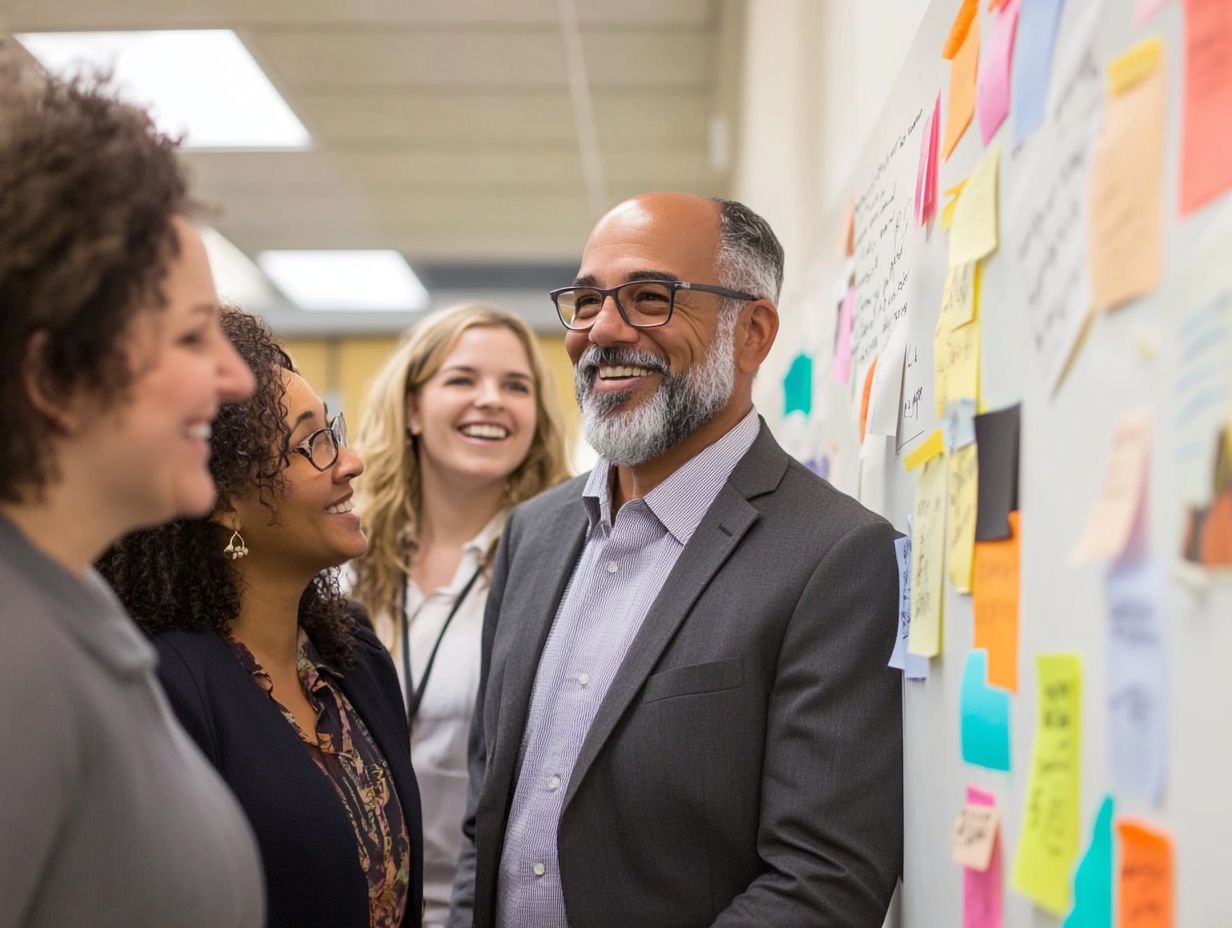Positive Thinking Techniques for Team Motivation
In today s fast-paced work environment, fostering a culture of positive thinking can truly transform team motivation.
This article explores the impact of positive thinking on team dynamics. It presents practical techniques such as visualization, affirmations, and gratitude practices.
You’ll learn how to create a supportive work atmosphere by emphasizing effective communication and recognizing achievements.
Discover strategies to combat negative thought patterns and infuse positivity into team meetings. By embracing these approaches, you can cultivate an uplifting and productive environment where your team can thrive.
Contents
- Key Takeaways:
- The Power of Positive Thinking
- Techniques for Promoting Positive Thinking
- Creating a Positive Work Environment
- Overcoming Negative Thinking Patterns
- Implementing Positive Thinking in Team Meetings
- Frequently Asked Questions
- What are some positive thinking techniques for team motivation?
- How can a positive mindset benefit team motivation?
- Why is it important to use positive thinking techniques for team motivation?
- How can leaders incorporate positive thinking techniques into team motivation?
- Can positive thinking techniques be used for remote teams?
- How can team members support each other’s positive thinking?
Key Takeaways:

- The impact of positive thinking on team motivation cannot be underestimated.
- Visualization, affirmations, and gratitude practice are powerful techniques for promoting positive thinking within a team.
- Creating a positive work environment through communication, collaboration, and recognition of successes can enhance team motivation and morale.
The Power of Positive Thinking
The power of positive thinking brings a wealth of benefits that elevate your personal well-being and profoundly influence workplace culture. This nurtures an environment ripe for job satisfaction.
By embracing a positive mindset, you can ignite optimism and resilience within your team. This fosters emotional intelligence and boosts overall productivity.
Integrating positive attitudes into your work life reduces stress and helps manage negative thoughts. You cultivate a supportive atmosphere that promotes kindness and constructive feedback.
This change can make a big difference in your career, laying the groundwork for long-term success and personal accountability.
Understanding the Impact on Team Motivation
Positive thinking significantly impacts your team’s motivation. For those interested in exploring this concept further, the evolution of positive thinking techniques highlights how a supportive workplace fosters growth and resilience.
This environment allows you and your colleagues to pursue personal goals and achieve impressive results in your projects.
When encouraged to develop positive habits like setting achievable targets and celebrating small victories your collective morale naturally soars.
This aligns beautifully with the idea that flexible scheduling provides the autonomy needed to manage your workload effectively. This enhances not just productivity, but your overall sense of well-being.
In this nurturing space, you and your teammates engage more with your tasks. You are driven by a culture that values each person s aspirations.
As you thrive individually, the entire team’s performance benefits. This fosters a dynamic where everyone moves forward together toward common objectives.
Techniques for Promoting Positive Thinking
Techniques for promoting positive thinking are crucial for creating a supportive environment that nurtures emotional intelligence among team members.
This approach enables individuals to adopt positive habits that significantly enhance their mental attitude and overall well-being.
By integrating practices such as visualization, positive affirmations, and gratitude exercises into your daily routine, you can manage stress more effectively.
Incorporate deep breathing and mindful practices into your workplace. These can greatly improve team dynamics and foster a culture of positivity that everyone benefits from.
Visualization
Visualization is an exceptional technique that enables you to cultivate a positive mindset. It allows you to mentally rehearse achieving your personal goals while sharpening your mental attitude (your overall outlook and approach to challenges) and focus.
By vividly imagining your success and the steps required to reach it, you can access your subconscious mind. This reinforces your belief that your goals are within reach. This mental practice fuels your motivation and enhances your clarity and direction, making it an invaluable asset for your personal aspirations and professional pursuits.
For example, when preparing for a significant presentation, your team can engage in visualization exercises. By confidently envisioning success, you can significantly reduce anxiety. When you combine this process with deep breathing techniques, it becomes even more effective. This combination calms your nervous system and fosters a focused state that boosts your overall productivity and resilience in the face of challenges.
Affirmations

Positive affirmations are a powerful tool for cultivating a culture of workplace positivity. They enable you to engage in uplifting self-talk that reinforces your personal responsibility and enhances emotional resilience.
By weaving simple yet impactful phrases into your daily routine, you can shift your mindset toward gratitude and self-efficacy. Just a few moments of reflection each morning can skyrocket your overall morale! Imagine taking time to acknowledge your achievements and set your intentions.
When you promote these habits through team workshops, you create a supportive environment. Everyone collectively embraces accountability and growth. Regularly celebrating small wins and expressing appreciation for your colleagues can transform workplace dynamics, leading to a more harmonious and productive atmosphere.
Encouraging these habits will enhance your interactions and foster lasting change in your workplace culture.
Gratitude Practice
Incorporating a gratitude practice into your daily routine can significantly elevate your personal well-being. It nurtures emotional intelligence, ultimately enriching the atmosphere within your workplace culture.
When you take the time to acknowledge and appreciate even the smallest aspects of your life and work environment, you cultivate a mindset of positivity that resonates beyond yourself. This simple yet powerful act can enhance your relationships with coworkers. Expressing gratitude often fosters greater empathy and understanding among colleagues.
For instance, maintaining a gratitude journal or sharing appreciation during team meetings can encourage open communication. This strengthens a sense of community. Research indicates that individuals with strong emotional intelligence sharpened through gratitude tend to navigate workplace challenges with greater ease, promoting collaboration and innovative problem-solving.
Embracing such practices not only bolsters your personal resilience but also plays a vital role in cultivating a thriving, supportive workplace culture.
Creating a Positive Work Environment
Creating a positive work environment is essential for enhancing team communication and cultivating a supportive atmosphere. In this space, constructive feedback is not only valued but actively encouraged. This paves the way for increased job satisfaction and personal accountability among employees.
You ll find that when everyone feels supported and heard, the entire team thrives.
Encouraging Communication and Collaboration
Encouraging communication and collaboration within your team is vital for enhancing emotional intelligence and fostering the positive habits that lead to effective team building.
By creating an environment where every member feels safe to express their ideas and concerns, you strengthen interpersonal skills and build trust. Regular check-ins and open forums for feedback help establish a culture of transparency.
Team-building exercises can further enhance this dynamic, allowing individuals to appreciate diverse perspectives and emotional cues.
Developing good listening skills and empathy can significantly elevate your team’s interactions, creating an atmosphere where collaboration thrives. You’ll see your team transformed into a cohesive, innovative, and resilient powerhouse!
Recognizing and Celebrating Successes
Recognizing and celebrating successes within your team is essential for fostering workplace positivity and encouraging open communication. It reinforces a culture of appreciation that acknowledges everyone’s achievements.
When you make your team members feel valued for their contributions, you boost morale and encourage ongoing collaboration. For example, consider hosting a monthly recognition luncheon where achievements are shared. This fosters camaraderie and inspires a healthy spirit of competition.
Another option is implementing a digital recognition platform, allowing peers to highlight each other s accomplishments in real-time, ensuring that every victory big or small is celebrated.
Incorporating personalized tokens of appreciation, such as handwritten notes or small gifts, elevates the significance of recognition. These thoughtful practices enhance individual confidence and strengthen team cohesion, creating a positive feedback loop that motivates everyone to strive for excellence.
Overcoming Negative Thinking Patterns

Overcoming negative thinking patterns is crucial for nurturing a healthier mindset. By addressing these patterns, you can transform your perspective, manage stress more easily, and foster positive self-talk, all of which significantly enhance your emotional intelligence.
Identifying and Challenging Negative Thoughts
Identifying and challenging negative thoughts is a crucial step in embracing personal responsibility and enhancing your emotional intelligence. This process promotes mindful practices that encourage a more positive outlook.
By becoming aware of these detrimental thought patterns, you can start to understand their origins and how they influence your daily experiences. Mindfulness techniques, which include practices like meditation and deep breathing, can be powerful allies in this journey, encouraging you to observe your thoughts without judgment.
Recognizing your triggers and automatic responses is essential. The practice of reframing negative beliefs into more constructive ones is also important. Engaging in reflective journaling can be highly effective; it offers clarity and perspective, helping to dismantle irrational assumptions and cultivate a healthier mindset.
Replacing Negative Self-Talk with Positive Affirmations
Replacing negative self-talk with positive affirmations is crucial for enhancing your personal well-being and nurturing emotional intelligence, ultimately fostering a more uplifting workplace atmosphere.
This transformative practice encourages you to cultivate a healthier self-image and builds resilience when facing challenges. Instead of thinking, “I am not good enough,” you might affirm, “I am capable and valuable.” In team environments, embracing phrases like “We can overcome this together” can ignite collaboration and elevate morale.
By weaving these positive affirmations into your daily routine, you enhance your emotional intelligence, leading to improved communication, empathy, and conflict resolution. This creates a supportive environment where you and your colleagues can truly thrive.
Implementing Positive Thinking in Team Meetings
Implementing positive thinking in your team meetings means embracing positive language and nurturing collaborative discussions. This approach not only enhances emotional intelligence but also helps everyone understand and manage feelings better, creating an atmosphere brimming with positivity.
Incorporating Positive Language and Mindset in Discussions
Incorporating positive language and a constructive mindset into your discussions is essential for elevating team communication.
This fosters a collaborative environment that nurtures emotional intelligence.
When you and your team members consciously embrace affirming phrases and offer constructive feedback, you create an atmosphere where everyone feels valued and enabled. This type of environment not only promotes open dialogue but also cultivates a profound sense of belonging, which is vital for effective teamwork.
Using positive language can make a real difference by reducing conflict and enhancing understanding, enabling you to navigate challenges with resilience. This practice strengthens relationships among team members and enhances collective problem-solving skills, leading to more innovative and effective outcomes.

Encouraging your team members to share their positive experiences fosters a culture of positivity, enhancing communication and emotional intelligence within the workplace.
When individuals openly express their achievements and uplifting moments, it not only boosts morale but also fosters a sense of belonging and trust among colleagues. This practice motivates team members to actively listen to one another, leading to deeper relationships.
As these positive experiences circulate, they can reduce workplace stress and elevate overall engagement, creating a harmonious environment where everyone feels valued. Such dialogue not only recognizes individual contributions but also nurtures empathy, a vital component of emotional intelligence, ultimately enabling the team to tackle challenges with resilience.
Frequently Asked Questions
What are some positive thinking techniques for team motivation?
1. Encourage a growth mindset – focus on learning and improvement rather than failure and success.
2. Practice gratitude and appreciation – take time to acknowledge and thank team members for their contributions.
3. Use positive affirmations – remind team members of their strengths and potential.
4. Cultivate a solution-oriented attitude – focus on finding solutions rather than dwelling on problems.
5. Celebrate successes – recognize and celebrate team achievements, no matter how small!
6. Foster a supportive and inclusive team culture – create an environment where team members feel valued and supported.
How can a positive mindset benefit team motivation?
A positive mindset can boost team motivation in several ways:
- It helps team members overcome challenges.
- It boosts team morale and joy at work.
- It encourages collaboration and unity.
- It enhances problem-solving and creativity.
Why is it important to use positive thinking techniques for team motivation?
Using techniques for positive thinking in the workplace for team motivation can lead to a more engaged and productive team. It can also create a positive work culture and improve overall team dynamics. Positive thinking helps team members cope with stress and challenges, leading to better overall mental well-being.
How can leaders incorporate positive thinking techniques into team motivation?
Leaders can incorporate positive thinking techniques into team motivation by: modeling positive behavior and language, providing regular feedback and recognition, encouraging a growth mindset and emphasizing learning and development, creating a supportive and inclusive work environment, and facilitating team-building activities while fostering open communication.
Can positive thinking techniques be used for remote teams?
Yes, positive thinking techniques can be just as effective for remote teams. Leaders can utilize virtual team-building activities, recognize and appreciate team members’ efforts through video conferencing, and encourage a positive and solution-oriented mindset through online communication channels.
Start implementing these positive techniques today and watch your team’s motivation soar!
How can team members support each other’s positive thinking?
- Offer words of encouragement and support.
- Be attentive and listen actively to one another.
- Share helpful advice and help each other find solutions.
- Celebrate each other s successes.
- Let s build a vibrant culture where positivity and appreciation thrive!






